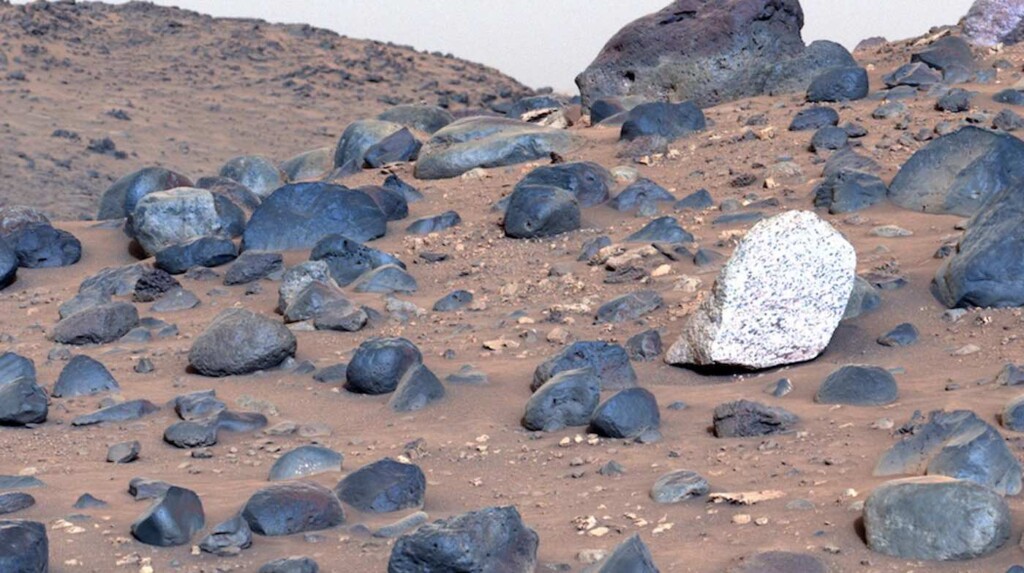 Detail of image taken by NASA’s Perseverance rover shows boulder field on “Mount Washburn” Credit: NASA / Western Washington University / SWNS
Detail of image taken by NASA’s Perseverance rover shows boulder field on “Mount Washburn” Credit: NASA / Western Washington University / SWNSScientists are puzzling over a bright white rock, of the type never before observed on Mars.
NASA's Perseverance rover spotted the 14-inch-high boulder starkly standing out in a large field covered with dark rocks in a region named Mount Washburn, inside the massive Jezero crater.
Nicknamed Atoko Point by researchers, the boulder is 18 inches wide and has speckles on a light-toned surface.
Instrument analysis by Perseverance’s SuperCam and Mastcam-Z indicates that the rock is at least partly composed of the minerals pyroxene and feldspar.
“In terms of the size, shape, and arrangement of its mineral grains and crystals—and potentially its chemical composition—Atoko Point it is in a league of its own,” said NASA in a news release.
“The diversity of textures and compositions at Mount Washburn was an exciting discovery for the team, as these rocks represent a grab bag of geologic gifts brought down from the crater rim and potentially beyond,” said team co-leader Brad Garczynski of Western Washington University.
“Among all these different rocks, there was one that really caught our attention.”
Perseverance, which landed on the Red Planet in 2021 specifically to probe the ancient crater, encountered the sparkly boulder while traversing a dried river delta that once flowed billions of years ago. On its way to an area inside the rim where rocky outcrops are being examined for sediment that could shed light on Mars' history, the rover changed course to avoid rough terrain. It took a short cut through a dune field and reached the hill strewn with boulders.
 Composed of 18 images, this natural-color mosaic from Mars shows the boulder field inside Jezero Crater – NASA / SWNS / Western Washington University
Composed of 18 images, this natural-color mosaic from Mars shows the boulder field inside Jezero Crater – NASA / SWNS / Western Washington UniversitySome of the Perseverance scientists speculate the minerals that make up Atoko Point were produced in a subsurface body of magma that is possibly exposed now on the crater rim.
Others on the team have suggested the boulder may have been created far beyond the walls of the Red Planet’s 28-mile-wide Jezero crater and transported there by the “swift Martian waters” eons ago.
“Either way, the team believes that while Atoko is the first of its kind they’ve seen, it won’t be the last,” says NASA.
A key objective for Perseverance’s mission on Mars is astrobiology, including caching samples that may contain signs of ancient microbial life.
LIFE ON MARS? Mars Rover Discovers Evidence of Liquid Salt Water on the Red Planet For the First Time
The rover will characterize the planet’s geology and past climate, with the aim to pave the way for human exploration of the Red Planet, and be the first mission to collect and cache Martian rock and regolith.
LAUNCH THE MYSTERY Onto Social Media By Sharing With Science Fans…
Source link

